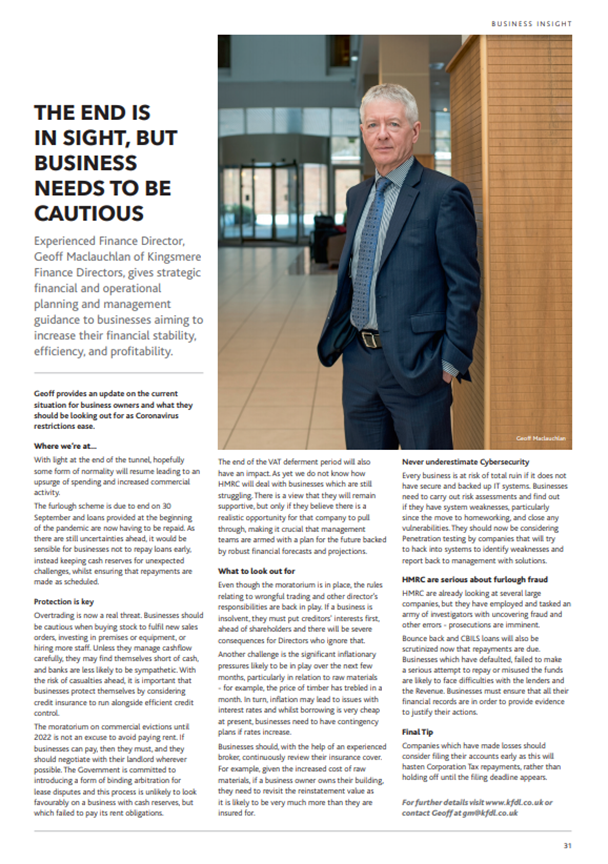Helping businesses to grow by improving financial stability, efficiency and profitability, leaving management to focus on running and developing the business.
The End is in Sight, but Businesses Need to be Cautious

Featured in the latest edition of Northern Insight, Geoff provides an update on the current situation for business owners and what they should be looking out for as Coronavirus restrictions ease.
Where we’re at…
With light at the end of the tunnel, hopefully some form of normality will resume leading to an upsurge of spending and increased commercial
activity.
The furlough scheme is due to end on 30 September and loans provided at the beginning of the pandemic are now having to be repaid. As there are still uncertainties ahead, it would be sensible for businesses not to repay loans early, instead keeping cash reserves for unexpected challenges, whilst ensuring that repayments are made as scheduled.
Protection is key
Overtrading is now a real threat. Businesses should be cautious when buying stock to fulfil new sales orders, investing in premises or equipment, or hiring more staff. Unless they manage cashflow carefully, they may find themselves short of cash, and banks are less likely to be sympathetic. With the risk of casualties ahead, it is important that businesses protect themselves by considering credit insurance to run alongside efficient credit control.
The moratorium on commercial evictions until 2022 is not an excuse to avoid paying rent. If businesses can pay, then they must, and they should negotiate with their landlord wherever possible. The Government is committed to introducing a form of binding arbitration for lease disputes and this process is unlikely to look favourably on a business with cash reserves, but which failed to pay its rent obligations.
The end of the VAT deferment period will also have an impact. As yet we do not know how HMRC will deal with businesses which are still struggling. There is a view that they will remain supportive, but only if they believe there is a realistic opportunity for that company to pull through, making it crucial that management teams are armed with a plan for the future backed by robust financial forecasts and projections.
What to look out for
Even though the moratorium is in place, the rules relating to wrongful trading and other director’s responsibilities are back in play. If a business is insolvent, they must put creditors' interests first, ahead of shareholders and there will be severe consequences for Directors who ignore that.
Another challenge is the significant inflationary pressures likely to be in play over the next few months, particularly in relation to raw materials - for example, the price of timber has trebled in a month. In turn, inflation may lead to issues with interest rates and whilst borrowing is very cheap at present, businesses need to have contingency plans if rates increase.
Businesses should, with the help of an experienced broker, continuously review their insurance cover. For example, given the increased cost of raw materials, if a business owner owns their building, they need to revisit the reinstatement value as it is likely to be very much more than they are insured for.
Never underestimate Cybersecurity
Every business is at risk of total ruin if it does not have secure and backed up IT systems. Businesses need to carry out risk assessments and find out if they have system weaknesses, particularly since the move to homeworking, and close any vulnerabilities. They should now be considering Penetration testing by companies that will try to hack into systems to identify weaknesses and report back to management with solutions.
HMRC are serious about furlough fraud
HMRC are already looking at several large companies, but they have employed and tasked an army of investigators with uncovering fraud and other errors - prosecutions are imminent.
Bounce back and CBILS loans will also be scrutinized now that repayments are due. Businesses which have defaulted, failed to make a serious attempt to repay or misused the funds are likely to face difficulties with the lenders and the Revenue. Businesses must ensure that all their financial records are in order to provide evidence to justify their actions.
Final Tip
Companies which have made losses should consider filing their accounts early as this will hasten Corporation Tax repayments, rather than holding off until the filing deadline appears.
You can see the article on page 31 in August's edition:

